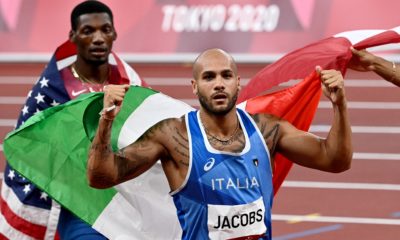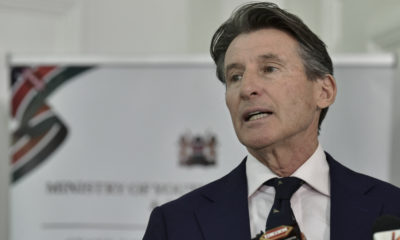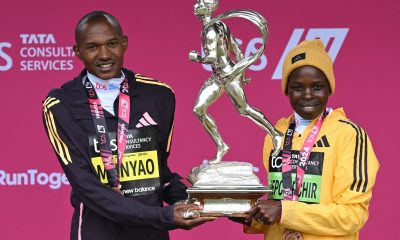
Kenya’s 10 kilometres road race world record holder Rhonex Kipruto became the latest Kenyan athlete to be suspended for a doping offence on Wednesday by the Athletics Integrity Unit (AIU).
The AIU said the 23-year-old – who won 10,000 metres bronze in the 2019 world championships – had been “provisionally suspended” for the “use of a Prohibited Substance/Method (ABP)”.
The ABP (Athlete Biological Passport) can show discrepancies that can reveal the effects of doping.
But Kipruto insisted he did not take drugs and his management team also said they believed he was a clean athlete.
“I don’t cheat or dope! The truth is on my side,” he said in a statement.
Kipruto set the 10km record of 26 minutes 24 seconds in Valencia in 2020 but he finished a disappointing ninth in the 10,000m at the Olympics in 2021.
Close on 70 Kenyan athletes – mainly distance runners – have been banned in the last five years for drugs offences in a crisis that has tarnished the East African track and field powerhouse.
Kipruto’s Prague-based management company Ikaika Sports protested at the AIU decision, saying the athlete was “being publicly prosecuted with no direct evidence” but admitted that Kipruto had been informed by the AIU of alleged inconsistencies in his blood tests since 2018.
‘Honest young man’
Kipruto’s coach Colm O’Connell, who is based in Kenya’s renowned athletics training hub of Iten, also voiced concern about the AIU move.
“I know Rhonex is an honest young man and it hurts to see him suffering now,” said O’Connell, who has coached more than 20 Kenyan world and Olympic champions, including the 2012 London Olympic 800m gold medallist David Rudisha.
“I have said many times that I am in favour of systematically combating doping so that we can protect clean athletes like Rhonex.”
In March, AIU head Brett Clothier warned during a visit to Kenya that the international anti-doping body was stepping up its investigations and testing in the country.
The AIU also said in April that Kenyan athletes were being assisted in covering up doping offences by a “medically-savvy operation”.
Its claims followed an investigation into falsified medical documents from marathon runner Betty Wilson Lempus and 800m specialist Eglay Nalyanya.
Lempus was given a five-year doping ban in January while Nalyanya was suspended this month for eight years for using a prohibited substance.
Kenya reacted by promising on April 20 it would more than triple annual drug testing of athletes.
Sports Minister Ababu Namwamba said Kenya was targeting 3,445 tests a year – compared to the current 1,000 – for its 37,900 athletes and support personnel.
The plans were unveiled in a report issued by an anti-doping steering committee set up in December, 2022, after the government announced it was committing $5 million a year over five years to try to combat drug abuse in the sport.
The committee also announced proposals to beef up its investigation mechanisms and monitoring of athletes, with, for example, biological passports, as well as developing educational programmes.

World Cup News
-
FIFA World Cup
/ 2 weeks agoSaudi oil giant Aramco agrees major FIFA sponsorship deal
Saudi Arabia’s state oil giant Aramco and world football governing body FIFA on Thursday...
By AFP -
FIFA World Cup
/ 2 months agoSon scores but Thailand hold South Korea in World Cup qualifier
Son Heung-min scored but South Korea were held 1-1 at home by Thailand in...
By AFP -
FIFA World Cup
/ 2 months agoJapan-N. Korea World Cup game to stay in Pyongyang, JFA says
Japan’s World Cup qualifier against North Korea will be played in Pyongyang as planned...
By AFP -
FIFA World Cup
/ 2 months agoGerman ex-FA bosses on trial over World Cup tax evasion
Three German ex-top football officials went on trial on Monday in a 13.7-million-euro ($14.8...
By AFP

English Premier League
Emotional Edwards in tears with Luton on brink of relegation

Winter Olympics
Watch: Geisenberger wins sixth Olympic medal to tie luge record





































